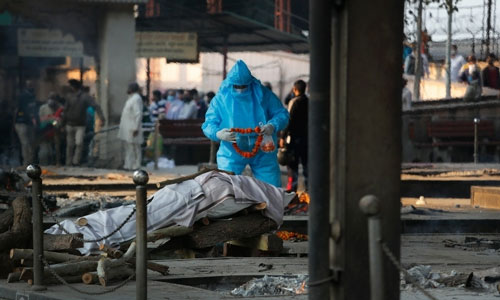New Delhi
India’s coronavirus caseload passed nine million on Friday, as hospitals in the capital New Delhi came under increasing pressure and graveyards began to fill up.
The world’s second worst hit country has now also registered more than 132,000 deaths from the disease, according to the latest official figures, which are widely seen as understating the true scale of infection.
India has seen a drop in daily cases over the past month but it is still registering about 45,000 new instances on average every day.
New Delhi, facing the dual scourge of winter pollution and coronavirus, has seen infections soar past half a million with a record rise in daily cases.
On Thursday, the mega city’s government quadrupled fines for not wearing a mask in an effort to get a grip on the outbreak.
At one of Delhi’s largest cemeteries, burial space is fast running out, gravedigger Mohammed Shamim told AFP.
“Initially when the virus broke [out], I thought I’ll bury 100-200 people and it’ll be done. But the current situation is beyond my wildest thoughts,” Shamim said.
“I only have space left for about 50-60 burials. Then what? I have no idea.” India imposed a stringent lockdown in March but restrictions have been gradually eased as the government seeks to reboot the economy after the loss of millions of jobs. Experts say this has helped spread the disease, as has a general reluctance to wear masks and maintain physical distancing. But those restrictions are now coming back.
Authorities in the western city of Ahmedabad have imposed a complete curfew over the weekend.
“During this period, only shops selling milk and medicines shall be permitted to remain open,” local official Rajiv Kumar Gupta said.
“The increase in numbers of cases is a concern, primarily because it is driven by people not following the basic protocol of corona-appropriate behaviour,” said Anand Krishnan, a community medicine professor at Delhi’s All India Institute of Medical Sciences.
Hemant Shewade, a Bangalore-based community medicine expert, said it was likely cases outside major towns and cities were not being taken into account in the official numbers. “My guess is that it is spreading slowly and silently in rural areas,” Shewade told AFP. In Delhi, the spectre of the virus wreaking havoc has come back to haunt its 20 million residents, as families scramble to arrange hospital beds.
Over 90 per cent of intensive care beds with ventilators were occupied as of Thursday, a government mobile app showed.
“My father’s oxygen saturation level dipped to 35pc suddenly and we rushed to the nearby hospital but there were no beds available,” Delhi resident Rajeev Nigam told AFP.
“We ran all night from one hospital to another but it was the same story everywhere,” he said, blaming the Delhi government for being “unprepared” and “callous” in its approach.
Distraught families were making fervent pleas on social media, tagging Chief Minister Arvind Kejriwal for help in securing beds.
Under pressure to control the new wave, Kejriwal on Thursday announced the addition of 1,400 intensive care beds.
Jeevendra Srivastava, an advertising professional, said Delhi was paying the price for overcrowding during the ongoing festive season.
“It’s shocking how a few people still are not taking this deadly virus seriously,” said Srivastava, 47.
“People are still going to crowded places without masks. It’s because of this irresponsible behaviour that now almost every second house has a case of the virus. “—AFP










